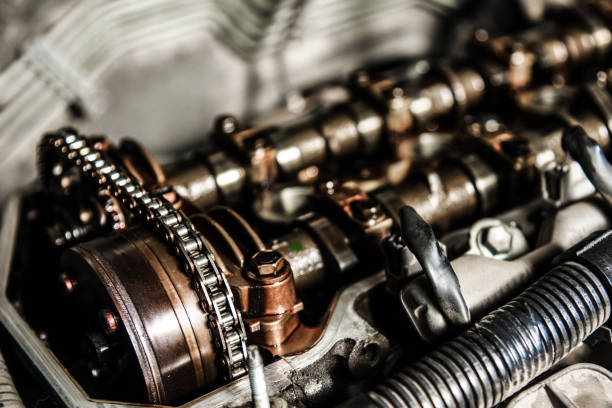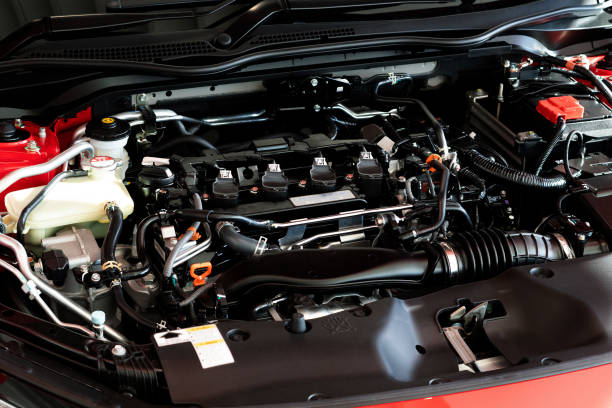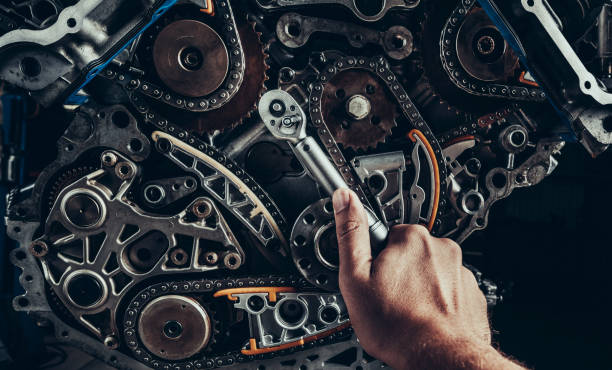Having a healthy engine makes car owners happy. You would anticipate hearing that sweet engine purr when you turn the key in your ignition or push the start button. However, it can be extremely alarming if the engine makes strange noises when you start it, while you’re driving, or just sitting still.
An engine knocking sound is frequently described as a metallic pinging noise that sounds like metal balls being shaken in a tin can.
For more information on engine knock, keep reading.
What Does Engine Knock Sound Like?
A common description of an engine knocking sound is a metallic pinging sound that sounds like metal balls being shaken in a tin can. Some engines commonly make a slight engine knock noise when accelerating slowly or going uphill. The sound that emanates from the engine compartment can be described as a metallic tapping sound that varies with engine speed. Some vehicles also make a metallic ticking sound right after starting up, which is caused by the pistons. Engine knocking can be brought on by using fuel with a too-low octane rating, carbon buildup in the engine, or a poorly tuned engine.
What Causes Engine Knock?
Detonation Knock: Too Low Octane
We must first understand what detonation knock is. A single, controlled detonation occurs inside each cylinder when your engine is operating at peak efficiency. When the air-fuel mixture in the cylinders ignites more than once at a time, it makes a knocking noise called a detonation knock. The air/fuel mixture may begin to ignite in some areas too soon. These tiny fireballs knock against one another when they collide.
You might experience engine knock if you put fuel with a too-low octane rating in a car with a performance-tuned engine designed for high-octane fuels. Higher octane fuels burn more consistently and don’t knock. So your knocking noise may have started if you used regular unleaded in a vehicle that requires premium fuel. For information on the recommended octane rating for your vehicle, make sure to consult your owner’s manual.
Detonation Knock: Bad Timing
The timing of the engine, or when the spark plugs will ignite, is usually controlled by a computer in today’s vehicles. But if the spark isn’t firing precisely when it should be for any reason, this can result in multiple cylinder detonations, which can cause an engine knock.
Detonation Knock: Lean Air/Fuel Mixture
A lean air/fuel mixture in the engine can be caused by issues with the mass airflow sensor, fuel injectors, oxygen sensors, or fuel pump. A lean fuel/air mixture has too much air and insufficient fuel. Engine knock occurs when there is insufficient fuel in each cylinder, causing the mixture to burn too slowly and allowing for multiple detonations.
Detonation Knock: Bad Knock Sensor
Since the air/fuel ratio, fuel injectors, and timing are all computer-controlled, engine knock is fortunately not a common issue with modern vehicles. Even an engine knock sensor is available to identify the issue and alert the engine control unit, allowing it to take automatic action.
Naturally, this means that a malfunctioning knock sensor could cause the engine to knock. Checking the knock sensor is a crucial step in the diagnostic process if your modern vehicle has an engine knock.

Rod Knock: Worn Bearings
Engine knock can also be caused by rods. The crankshaft is turned as the engine’s pistons rise and fall, which ultimately propels the wheels. Smooth piston movement is made possible by the rod bearings, but over time, they may wear out or shift out of place. A very similar knocking sound is produced as the bearings deteriorate because the pistons begin to jostle against the crankshaft. This can be a time-consuming repair because the pistons and crankshaft are deep inside the engine and may require new bearings or other work to fix the issue.
Bad Belt Tensioners/Pulleys
Another potential cause of engine knocking isn’t even related to the engine itself. It might be coming from the accessory belt. A belt that is attached to various pulleys located throughout the engine bay is turned by the engine as it runs. For this belt to turn quietly and smoothly, the ideal amount of tension must be applied. You may hear rattling, clicking, and slapping noises that could be mistaken for engine knock if the belt becomes stretched out, the tensioner isn’t operating properly, or one of the pulleys becomes misaligned. Fortunately, a noisy accessory belt can often be resolved by simply changing the accessory belt, adjusting the tension, or replacing a faulty accessory pulley or tensioner.
How to Fix Engine Knocking?
The first thing to do when dealing with engine knocking noises is to check the oil level. If you’re lucky, adding fresh oil to the engine may stop the noise (at least momentarily).
The bad news is that even if the noise does stop, there’s a good chance that the lack of lubrication has already permanently damaged internal engine components.
Some people put additives in the engine oil in an effort to stop the knocking, but those additives almost never work (and if they do, it’s only as a temporary Band-Aid fix). Spending money is not worth it.
There is only one way to fix the issue if the oil is full and the engine is knocking, and that is to properly fix the vehicle.
Other Similar Engine Noises and Causes
Engine Rattling
The engine is making rattling noises that resemble someone tapping on metal (some have compared it to a baby rattle).
Potential causes:
Low Engine Oil
Hydraulic timing chain tensioners may collapse or recede as a result of low oil levels, producing a rattling noise. When the engine oil level is low, the variable valve timing actuators may also make noise.
Loose Timing Chain
An issue with a loose timing chain may be present if you hear rattling coming from the front of the engine. The chain may be loose due to stretching, a broken guide, or a broken tensioner. Sometimes the chain will end up slamming into the timing cover, making a loud clattering sound.
Faulty Variable Valve Timing Actuator (Phaser)
The front of the engine may rattle due to a malfunctioning variable valve timing actuator (phaser). Variable valve timing (VVT), which is a feature of many contemporary vehicles, centers on the actuator.
When the actuator breaks down, it might rock back and forth erratically and rattle.
Loose Heat Shield
A loose heat shield is one much less expensive problem. The heat shields that cover the exhaust can become unfastened over time if the retaining fasteners break or are missing. It will then be possible for the loose shield to slap into the exhaust and other parts.

Engine Tapping Or Engine Ticking
Your engine may also make a ticking or tapping noise that is unnerving. Some claim that the sound is a heightened rendition of a ballpoint pen clicking.
Potential causes:
Low Engine Oil
Low engine oil is once more on the list. An engine may make a tapping or ticking noise if the oil level is too low, which prevents the valvetrain parts from receiving adequate lubrication.
Worn Valvetrain Components
Engine noises like tapping or ticking can be caused by worn or damaged valvetrain parts like rocker arms, lifters, and camshafts.
Piston or Wrist Pin Issues
The problem may be an excessive piston-to-wall clearance, also known as a piston slap, or a worn piston wrist pin if you hear a metallic tapping sound. Once the engine has warmed up, minor piston slaps may disappear.
An exhaust leak
An internal engine issue isn’t always indicated by a tapping or ticking noise. An exhaust leak from the exhaust manifold, downpipe, etc. may also be the problem.
Can I Drive on a Knocking Engine?
If the engine is knocking, your car might be able to move on its own for a short distance. Your engine will suffer more extensive damage the longer you continue to drive with the issue.
For instance, if your engine is knocking due to low oil, continuing to drive will almost certainly result in serious internal engine issues. Even the entire engine could stop working.
It’s also unwise to keep the engine running while hearing rattling, tapping, or ticking noises. Any of these noises could be an indication of an important issue that, if ignored, will only get worse as you drive.
Therefore, until the issue is resolved, do not drive the vehicle if the engine is knocking or making any other strange noises.
Summary
In most cases, when someone mentions an engine knocking sound, they’re referring to a metallic pinging noise that resembles the noise made when metal balls or objects are shaken inside a tin can. Engine knocking can also sound like a rattle that grows louder and worsens in vibration. It sounds like marbles stuck in a blender when you turn your car’s engine on. During acceleration, while going uphill, or while the engine is idle, you might hear it.
In this article, we answered the question, “what does engine knocking sound like?” and more. Hope you’ll take the necessary steps to correct the issue and stop the engine from knocking.


